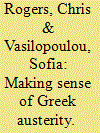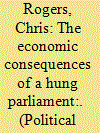| Srl | Item |
| 1 |
ID:
118233


|
|
|
|
|
| Publication |
2012.
|
| Summary/Abstract |
The process of approving a Greek drawing on funds provided by the international community is now familiar. There is concern about the prospect of securing an agreement between the International Monetary Fund (IMF), the European Union (EU), the European Central Bank (ECB), and Greece, which satisfies all parties. This paper suggests that all parties to the agreement have interests in an orderly resolution of the Greek crisis that keeps Greece in the Eurozone. Furthermore, it argues that disagreements and delay before eleventh-hour agreements can best be explained politically. The paper first demonstrates how Greece, the IMF, and the EU each have a clear interest in finding an orderly solution to the Greek crisis that allows it to remain in the Eurozone. It then outlines the incremental nature of the package and its strategic benefit both for the European banking sector, and governments in Greece and the Eurozone more broadly.
|
|
|
|
|
|
|
|
|
|
|
|
|
|
|
|
| 2 |
ID:
099783


|
|
|
|
|
| Summary/Abstract |
The British general election on 10 May 2010 delivered Britain's first hung Parliament since February 1974, and in the run-up, the Conservative party made much of the economic difficulties Britain faced in the second half of the 1970s in order to try and convince voters that anything other than a Tory vote would risk exposing the nation to the discipline of financial markets. The question of how well equipped an exceptional kind of British government is to deal with exceptional economic circumstances is therefore of paramount importance. This paper argues that the Conservative party made too much of the impact of the 1974 hung Parliament in precipitating subsequent economic crisis and suggests that as such, there is no reason to assume that the Conservative-Liberal coalition government is ill-equipped to manage British economic affairs in difficult circumstances.
|
|
|
|
|
|
|
|
|
|
|
|
|
|
|
|